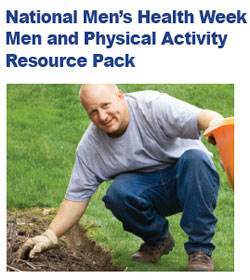My role
- About Us
NMHW 2010 Resources: Aims and Outcomes
 From relieving stress and anxiety to losing weight and reducing the risk of cancer, heart disease and diabetes, physical activity has lots going for it. It can even improve male sexual performance!
From relieving stress and anxiety to losing weight and reducing the risk of cancer, heart disease and diabetes, physical activity has lots going for it. It can even improve male sexual performance!The Week has three main objectives:
- To encourage more men to become more physically active (eg. walking, using the stairs, gardening, dancing, recreational cycling, DIY)
- To improve male participation in sport
- To develop the potential of sports settings (eg. stadia, leisure centres) for delivering health services and campaigns to men.
MHF acknowledges that women and girls are more likely to be inactive and that action must be taken to tackle this. But we believe that complementary action also needs to be taken to address the low levels of activity in many groups of men.
NMHW will not be a negative event focusing just on the problems that exist but will instead seek to promote a positive view of how the problems can be tackled by highlighting – and encouraging – better self-care by men and good practice within the health system and the world of sport.
As in previous years, NMHW 2010 will mark the start of a sustained work programme on improving men’s physical activity levels.
Main Outcomes
MHF aims to achieve the following through Men’s Health Week 2010 and subsequent work:
- The production and dissemination of new health promotion resources on men and physical activity that can be used by a wide range of health professionals to support their work with men on this issue.
- An enhanced understanding among health and related professionals of the barriers to physical activity participation levels in men – especially men aged over 35 and in routine/manual groups – and the opportunities that exist to tackle this through a gender-aware approach.
- More sports organisations engaging men in a wide variety of ways, including through greater involvement in physical activity and by utilising the power of sport to reach men in local communities and/or as spectators/supporters.
- The identification and highlighting of gaps in policy, practice and research that will form the basis for a continuing MHF work programme.
- An improvement in men’s awareness of the importance of physical activity and the many options available.
- The development of new initiatives to increase men’s participation in physical activity.
- An increase in men’s awareness of, and use of, a variety of NHS and other support services, including health trainers, health (vascular) checks, MidLifeCheck, NHS Choices, etc.
Page created on April 1st, 2010
Page updated on April 2nd, 2010
Comments
In This Section
Haringey health humour
I'd rather admit I love John Ryan!


 Donate to the MHF
Donate to the MHF
 Man MOT
Man MOT